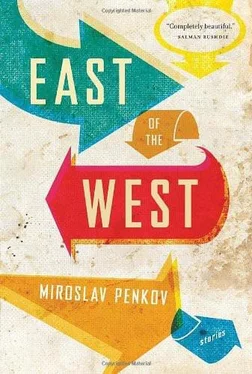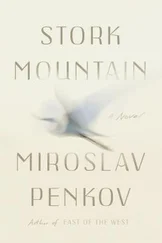“We cannot surrender,” Father said one night, and slammed a fist on the table. “No, thank you very much. We need to regroup, that’s all. There is opportunity that must be seized here. There is finally free market. People would pay to see your gift.” He held a cigarette to the candle and smoked for some time in silence. “Why couldn’t you be some other kind of genius?” he said at last. Then he said, “Go tell your mother to stop crying and fix some dinner. Then come back and help me figure out a way to introduce you to the crowd. I’m thinking something simple: ‘Ladies and Gentlemen, please welcome the Amazing Rado to the stage …’ ”
•
The flood drags us to the parliament building, the one Gramps wanted to kamikaze into with a tank. A double helix of policemen entwines around its base, but most of them look half asleep, tenth graders propped on their shields with apathetic weariness. They’ve been out here so long, four days now, it seems they’ve lost all interest. Gogo greets them accordingly. “Pigs, hooks, fucking Ushevs,” but even then they don’t react. One of them asks me if I got the time. His watch, he says, has stopped.
“Do I look like someone who cares?” I tell him, and then I ask Gogo the same.
“No, kopche , you just don’t give a shit.”
The crowd splits in two streams, because right in front of the parliament there stands a huge pile of stones. A huge pile. Someone has stuck a flag on top, white-green-red, but the flag has frozen like a pair of boxers on the laundry line.
I recognize now that everyone in the crowd is carrying a stone. As they pass by, the people dump their stones and the pile grows immense, ugly, like a pile of broken bodies. I know that’s not the freshest way to paint it, but that’s what it looks like to me: hands and feet on top of skulls and torsos.
I ask Gogo if he knows what this is all about. “The Amazing Rado doesn’t know?” he says, and I say, “Yeah, yeah, very funny.” I tell him I haven’t been home for a few days, remember? I haven’t watched TV the way he has, on a nice, big Sony Trinitron set.
“Oh, fuck you, kopche . That TV is the first thing I’m buying back.” He tells me then that all this masonry charade is part of the civilized protest. It was decided that people ought to lay stones this way instead of throw them like savage beasts. It’s all a message to the politicians inside.
“Kopche , we don’t have any stones,” I say.
A woman right beside opens her bag. “I have some extras,” she says. Her bag is a quarry. We each dump a stone on the pile and I’m thinking, some message this is. Dear madams, dear sirs, parliament members, we are displeased. Our pockets are full of stones, not money. Fix this injustice. We’re civil still, but we’re also hungry. Here are some of the stones we carry, in a pile.
We have become so meek, much worse than sheep. But I suppose five hundred years of Ottoman rule will do that to a people. And then forty-five years of the Communist yoke. That’s what’s eating me as we walk away from the pile. We didn’t used to be this way. We were once fierce horsemen. We stormed blazing from the east, shot arrows riding backward, made treaties with the Byzantines, conquered the Slavs. Man, would I have liked to live back then. When the treaties were broken we went to war. Khan Krum the Terrible slew Nikephoros, one of only a handful of Greek emperors to ever die in battle, and turned his perfectly human skull into a cup from which he sipped his wine. Tsar Simeon the Great defeated Leo the Wise and chopped off the noses of five thousand of his men, just because — just to insult him. And we weren’t simply a brute force: when Great Moravia imprisoned the first apostles who worked on creating our alphabet, we rescued them and let them transcribe books in the safety of our land. The seven apostles of the Cyrillic alphabet. Sedmochislenitsi . Those were some amazing men. And now what? A pile of stones. Stones are created to break skulls and we lay them down like flowers.
“Kopche,” Gogo says. “You look like a pelargonium someone’s pissed on.”
That’s a pretty common expression, but still I laugh. We keep on walking and I remember how in our block of flats some neighbors would keep their pots of ficus, of pelargoniums, out on the stairway and how Gogo and I sometimes pissed in those pots. Eventually the neighbors took their burned plants in, never daring to put them on the stairs again. And then it strikes me that it wasn’t Gogo but some other boy whose name I can’t remember, in some other block of flats a long, long time ago.
“We should do that again, kopche,” I say.
“Do what again?” asks Gogo.
•
Here is my all-time favorite joke. No one ever laughs when I tell it. A circus. Almost end of the show. The announcer says, “And now, ladies and gents, please welcome the boy with phenomenal memory.” Drumroll. A little boy walks into the ring and for ten seconds stares bluntly into the front rows. Complete silence. Then the announcer says, “And now the boy with phenomenal memory will piss on the front two rows.” People start running and the announcer says, “No point in running, ladies and gents. There is no escape. The boy with phenomenal memory already has all of you memorized.”
•
“Drugarki i drugari , dear comrades, please welcome the Amazing Rado!”
This is how my father introduces me to the crowd. For the past seven years, at least once a week. Nursing homes, neighborhood retiree clubs — of the retired engineer, retired welder, retired crane operator. There I am, in a room that smells of lavender spirit, in front of two rows of wheelchairs, trembling chins, dangling tubes, bags of urine, doing my mnemonic tricks to weak, Parkinsonian applause. And after that, my father begins his rounds among the rows, an empty three-liter jar in his hands. The label on the jar is peeled off almost completely and on the white space Father has scribbled boldly: Amazing Rado’s Scholarship Fund . But if you look closely, you’ll see a corner of the original label still standing and then you’ll know: this jar was once full of pickled cauliflower. On with his rounds Father goes, courting the poor old women, sweet-talking the poor old men. And sometimes, this week or the other, he manages to half fill the jar with wrinkled bills.
For seven years we’ve toured retiree clubs like these. We’ve read from the same old textbooks Father once found in the basement, beside the strings of dried, salted fish — history, chemistry, physics. I told him all of this once. I said, “In seven years a monkey will learn to recite the periodic table.”
“There is enough change in this country as it is,” Father said. “We have a good thing going. Why mess it up?”
And on he strolls between the rows, the jar in hand. He always goes for seconds, because sometimes people are too senile to remember whether they’ve dropped their share or not. I watch him from the side and wonder, is this the bright future he spoke of in the light of the candle? Is this the stellar potential he prophesized? And sometimes, this week or the other, I am convinced that in his mind we’re simply playing the cards we were once dealt, as best as we can. “Life has given us medlars,” Father sometimes says, “heaps, and heaps of tough, unripe medlars. We could sulk. We could cry. Or we could wait for the fruit to rot and turn it into marmalade.”
I wonder if you know what medlars are? If you’ve ever snuck into a cooperative orchard with rows and rows of the short trees, their branches heavy with fruit, filled your pockets, the bosom of your shirt, and then been chased by the orchard guard and shot at with pellets of salt, dropping brown medlars behind you as you ran, like a little scared goat? I wonder if you’ve eaten the fruit, sucked out the tart juice and munched on the pits, and then regretted it, because your gums feel swollen, your throat hurts, because the kid whose name you can’t remember got shot in the butt and then back home his father beat him for ruining his only good pair of pants? Kopche , I’m tired of waiting for the medlars to rot.
Читать дальше











